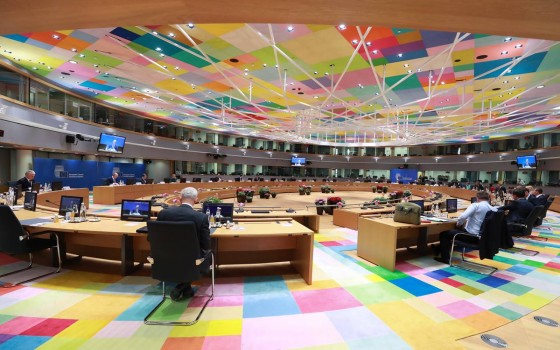
Gazprom "completely" stops gas supplies via Nord Stream to Europe

- Europe and Arabs
- Wednesday , 31 August 2022 18:34 PM GMT
AFP
Europeans are on a new state of alert after gas supplies were suspended Wednesday through the Nord Stream pipeline that connects Siberia fields to Germany, due to maintenance work expected to last three days, while energy prices continue to rise. The giant Gazprom group said in a statement on the Telegram application Wednesday that it had "completely" halted gas supplies through the Nord Stream line due to "the start of scheduled works at a gas compressor station" affiliated with Nord Stream. Data published by the European network "Entzog" for gas transportation indicated that the flow of gas had stopped completely since the early hours of Wednesday morning in the pipeline that directly connects gas fields in Siberia to northern Germany. From there the gas is exported to other European countries. Gazprom confirmed earlier that these maintenance work, which is scheduled to continue until Saturday, must take place "every thousand hours", that is, approximately every 42 days. However, energy resources are currently at the center of the confrontation between Russia and Western countries, which constantly accuse Moscow of using gas as a "weapon", in the context of the war in Ukraine. In recent months, Gazprom has reduced its gas supplies via Nord Stream by 80%. The head of the German Energy Regulatory Authority, Klaus Muller, considered that the current works are "incomprehensible at the technical level". He pointed out that past experiences indicate that Russia "takes a political decision after all it calls 'maintenance work'." - Rising prices - In addition to fears of a shortage of energy resources in the coming winter due to the decline in gas supplies, a new rise in electricity prices, which in recent days reached record levels, warns of the possibility of higher bills for European consumers. Speaking about the return of supplies after the three-day hiatus, Russian government spokesman Dmitry Peskov said that Western capitals "have imposed sanctions on Russia that do not allow the implementation of normal maintenance and repair work." Peskov's statements are not reassuring in light of past events, including Gazprom's 10-day maintenance work in July on the Nord Stream pipeline. The group resumed pumping gas after the works, but reduced shipments, which are now 20% of the pipeline's normal capacity. In recent weeks Russia has justified reducing its gas shipments by not returning a Siemens turbine, which was repaired in Canada, to Germany, due to sanctions. European countries accuse Moscow of delaying the return of the turbine to be able to justify reducing its shipments and thus putting pressure on it. Before the start of the Russian invasion of Ukraine, Nord Stream was transporting about a third of the amount of gas that the European Union purchased annually, amounting to 153 billion cubic meters, and then exported the gas from Germany to several European countries. - Increased use of liquefied natural gas - Uncertainty also prevails at the Baltic port of Lubmin, where the Nord Stream line ends. In an interview with Agence France-Presse, an official at Gascade, the company that transports gas via Nord Stream in Germany, says, "In July, maintenance was periodic and planned for a long time. This time, it was not planned and we do not know what is in store. this process". Facing the risks of a major energy crisis this winter, the European premiere economy has been struggling for several months to find alternatives to the Russian gas that Berlin relies on so much and to reduce its consumption. German Chancellor Olaf Scholz said Tuesday that his country's efforts are beginning to bear fruit, saying that Germany is "in a much better position in security of supplies than expected two months ago" and in terms of "dealing well with threats from Russia". And Economy Minister Robert Habeck announced Sunday that gas tanks are filling up "faster than expected" despite the sharp cut in Russian supplies. His ministry said the government's 85% storage target for October "is expected to be reached at the beginning of September". At the same time, in July the German industrial sector, which usually absorbs large amounts of energy, consumed 21.3 percent less gas than the average consumption recorded in the months of July from 2018 to 2021. New floating liquefied natural gas stations will start operating this winter, indicating a rise in the use of liquefied natural gas. It will be the first stop at Lubmin Port and will allow it to make up for part of the gas that no longer reaches it via Nord Stream. “We hope to be able to pump gas into the distribution network on December 1," said Stefan Knaby, head of the supervisory board of Deutsche Regas, which is implementing the floating LNG project in Lubmin.












No Comments Found